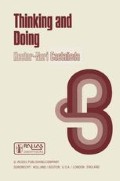Abstract
In the preceding chapter we argued that the logic of imperatives (i.e., mandates and prescription) is two-valued. We established that prescriptions have a semantical designated value analogous to truth, which we call Legitimacy or orthotes, in that it is both preserved by implication and preferred by practical attitudes of approval and endorsement. In this chapter we provide an account of that value, satisfying both the basic requirement of two-valuedness and the other criteria of adequacy set forth in Chapter 4, §6, as Prese. 11-Presc. 14. The account connects the semantical values of prescriptions both with the mechanisms of action and with the reasonableness of action.
Access this chapter
Tax calculation will be finalised at checkout
Purchases are for personal use only
Preview
Unable to display preview. Download preview PDF.
References
My Legitimacy-values have some kinship with Alf Ross’ ‘Objective Validity’, in Philosophy of Science 11 (1944): 30–46. Perhaps the main departures are (a) that I characterize them in terms of ends, conventions, and causal connections, and (b) that he was convinced that objective validity is a chimera. They also resemble Everett Hall’s legitimacy-values of both imperatives and ‘ought’-sentences. The main differences are: (1) I characterize them in terms of ends, whereas Hall had in mind some ultimate metaphysical or quasi-metaphysical property of assertions about values; (2) my Legitimacy-values do not apply to norms or to ‘ought’-sentences; (3) Hall’s values are at least three. Cf. his What is Value? (London: Routledge & Kegan Paul, 1952), pp. 154, 238n, et al.
Failure to see this difference vitiates Milton Fisk’s criticism of an earlier version of a thesis that appears in Chapter 8 § 1 below. In a friendly review of Morality and the Language of Conduct, in Natural Law Forum, Vol. 9 (1964), Fisk wrote of ‘Imperatives, Decisions, and Oughts: A Logico-Metaphysical Investigation’: ‘Castaneda himself holds that “X ought to do A” implies and is implied by the metalinguistic claim “The Imperative ‘X, do A!’ is [necessarily — left out by Fisk] justified”,… Yet this analysis seems to run up against the fact that there can be duties where imperatives are unjustified. Gentle persuasion, not raw imperative is needed in bringing many people around to do their duty… [1] “Peter ought to tell the truth” is true. But John’s telling [my italics] Peter to tell the truth…’ so [2] “The imperative ‘Peter, tell the truth’ is justified” is false. (p. 174). Fisk is of course, correct in speaking, in an ordinary sense of ‘justify’, of not being justified in telling Peter to tell the truth. But this not the use of ‘justified’ I explained as analogous to ‘true’, that predicates a semantical property of mandates, the one property preserved in implication — not a property of acts. Fisk does not show that [1] is true and [2] is false; his example shows that perhaps [1] can be true even if [3] “The imperative ‘John, tell Peter to tell the truth’ is justified” is false. But [2] does not imply [3]. In earlier writings including The Structure of Morality, the term ‘Justified’ is synonymous with ‘orthotic’. Keith Lehrer suggested the switch to ‘Legitimacy’ because ‘Justifiedness’ suggests, not the analogue of truth, but the analogue of the justifiedness of belief — which can obtain even if the belief is false proposition.
This point was not only ignored by Fisk, as noted in the preceding note, but also by Kai Nielsen who also wrote a perceptive review of ‘Morality and the Language of Conduct’ in The Philosophical Review 75 (1966). In a relevant part he says: “[On Castañeda’s view] complex metalinguistic assertions about resolutives and imperatives could replace the corresponding normatives. This last challenging thesis does not seem to me to be adequately sustained, for in his metalinguistic statements about resolutives and imperatives Castaneda ascribes to the imperatives or resolutives the semantical properties of justifiedness, nonjustifiedness, and unjustifiedness. But then we have not succeeded in dispensing with normatives, for they are used in our metalanguage”. (pp. 238f.) Nielsen did not heed the remark that justifiedness and nonjustifiedness are semantical values, analogous to truth and falsity. Thus, the statement *Imperative *X, do A* is justified* is not in that book a normative statement; it is not normative in exactly the way in which the statement *The proposition *The Earth is roundish* is true* is not normative, or even a geological statement.
This crucial distinction is one seriously absent from David Lyon’s discussions of several important issues in his Utilitarianism: Its Forms and Limits (Oxford, England: Clarendon Press, 1965), e.g., the sense of caeteris-paribus clauses (pp. 44 ff), criticism of Stout) (pp. 112ff), and his arguments for the material equivalence of acts and rule-utilitarianism (Chapter 4).
For the universality of morality and a total analysis of its complex structure, see H-N. Castañeda, The Structure of Morality. For a quick glance at the structure of morality, see Castañeda, ‘The Good Society and the Complexity of the Structure of Morality’, The Philosophic Exchange (1975).
Author information
Authors and Affiliations
Editor information
Editors and Affiliations
Rights and permissions
Copyright information
© 1982 D. Reidel Publishing Company, Dordrecht, Holland
About this chapter
Cite this chapter
Castañeda, HN. (1982). Imperative Designated Values: Orthotes and Anarthotes. In: Castañeda, HN. (eds) Thinking and Doing. Philosophical Studies Series in Philosophy, vol 7. Springer, Dordrecht. https://doi.org/10.1007/978-94-010-9888-5_5
Download citation
DOI: https://doi.org/10.1007/978-94-010-9888-5_5
Publisher Name: Springer, Dordrecht
Print ISBN: 978-90-277-1375-9
Online ISBN: 978-94-010-9888-5
eBook Packages: Springer Book Archive

